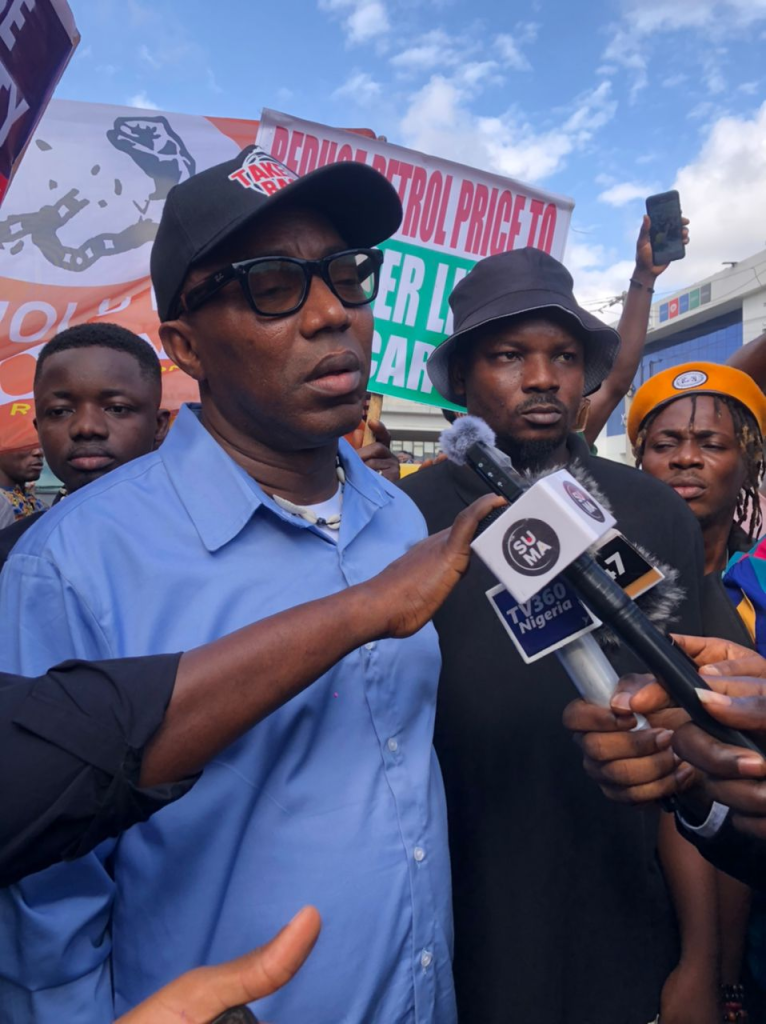October 1, Nigeria’s Independence Day, has become more than a celebration of freedom from colonial rule. It now symbolises something deeper; dissatisfaction, frustration, and a call for change. Today, as Nigeria marks its 64th year of independence, people fill the streets of major cities with both festivities and protests. The people are angry. The struggles they face today are different from those of 1960, but the cries for freedom and better living conditions remain just as urgent.
In Lagos, hundreds gathered early this morning at Ikeja Underbridge, with placards reading “Nigerians are hungry” and “Enough is enough.” The message is clear—people are tired of the daily hardships. The soaring prices of fuel, food, and basic commodities have stretched the patience of the masses to its limit. One protester summarized the mood, “We are buying fuel at N1,000, and you expect us not to protest?”. This year, the national conversation has shifted from reflections on the past to frustrations about the present.
The protests in Lagos are part of a larger national outcry. Abuja, the seat of government, has also seen its streets filled with protesters. At Utako Market, demonstrators carried signs calling for an end to bad governance. “Bad Governance has killed the dreams of Nigerian youth,” one banner read. People are fed up with what they see as broken promises and policies that worsen their economic plight. President Tinubu’s recent reforms, which included the removal of the fuel subsidy, were supposed to ease the country’s economic problems. Instead, they have led to a significant increase in the cost of living, leaving many struggling to afford even basic necessities.
The #FearlessInOctober movement, one of the driving forces behind today’s protests, has called for more than just economic relief. It is demanding justice for those arrested during the #EndSARS protests and an end to the systemic corruption that plagues the country. Protesters demand the release of political prisoners and silenced activists. The struggle for justice and human rights has grown in recent years, turning October 1 into a platform for their voices.

Port Harcourt is another flashpoint. There, peaceful protests quickly descended into chaos when suspected thugs infiltrated the demonstrations. Protesters were harassed, and some were forced to disperse. The use of intimidation tactics, many believe, is part of an orchestrated effort to prevent the people from voicing their discontent. However, this has not stopped Nigerians from standing firm. Many have vowed to continue protesting until their demands are met.
This year’s protests are a stark reminder that while Nigeria may be politically independent, many of its people still feel trapped by poverty and insecurity. The dream of a prosperous and united nation, envisioned at independence, remains elusive for millions. With inflation skyrocketing and unemployment at a record high, the average Nigerian is struggling more than ever. These protests are a reflection of the growing inequality in the country, where a small elite continues to prosper while the majority suffer.

One striking feature of today’s protests is the involvement of the youth. Young people, many of whom were not even born during the independence struggle, are now at the forefront of this new fight. They are calling for opportunities, better governance, and an end to corruption. They represent a generation that refuses to be silent, one that is determined to shape the future of the country. This shift is significant, as it shows that the fight for a better Nigeria is no longer just about political freedom, but about securing economic and social justice for all.
The protests also highlight a deeper issue—trust in leadership. Many Nigerians feel that their leaders have failed them. There is a widespread belief that those in power are more concerned with enriching themselves than with solving the country’s problems. Corruption, long seen as a cancer eating away at Nigeria’s progress, is at the heart of the people’s grievances. The government’s promises of reform and economic recovery have not materialized for the average citizen, and this disillusionment fuels the protests.
President Tinubu, in his Independence Day address, acknowledged the difficulties facing the country but promised that relief was on the way. He spoke of upcoming economic reforms that he believes will eventually ease the burden on Nigerians. However, for many on the streets today, these words ring hollow. They have heard similar promises from past administrations, and yet, their daily struggles continue to worsen. The gap between the government’s assurances and the reality on the ground is growing wider by the day.
As the day unfolds, the protests show no signs of slowing down. Across cities from Lagos to Abuja to Port Harcourt, people stand up to honor the past and demand a better future. October 1 is now a day to reflect on freedom from poverty, corruption, and injustice.
It is amazing how this day, once solely about celebration, now ushers in protests. For many, it is no longer just about marking a historical event. It is a day to hold those in power accountable. It is a day to remind the government that independence means more than just political freedom—it means a life free from the crippling weight of economic hardship.
The protests of October 1, 2024, will likely go down in history as a turning point. Whether they lead to meaningful change or not remains to be seen. But one thing is clear: the people of Nigeria are no longer content to sit in silence. They are ready to fight for the nation they deserve.
____________________________
Thank you for your time here. This means a lot to us. If you are passionate about driving change through workshops, e-mail info@insidesuccess.com. Find other related articles on our website and follow us on Instagram @InsideSuccessNigeria for more updates.



Leave a Reply